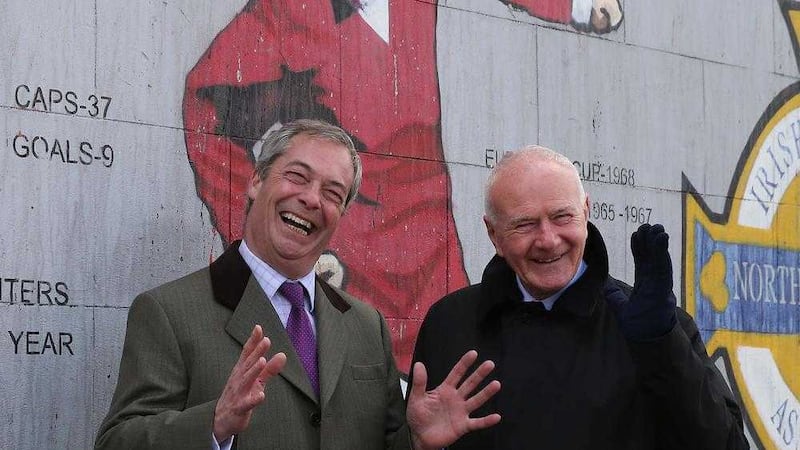One of my favourites on the BBC series Dragons’ Den was Hilary Devey, a no-nonsense, plain-speaking businesswoman from Bolton. She rarely missed and hit the wall, and she had a great turn of phrase.
Devey knew a thing or two about transport. She made her money when she launched Pall-Ex, a freight network and logistics company that shifts goods on pallets across the UK.
Sadly, Devey is no longer with us. She was just 65 when she died, but she left the world a better place. She campaigned for carers and was a patron of the Stroke Association.
Anyway, I digress. From time to time, one of her choice put-downs resurfaces from my sub-conscious. This time the prompt was Translink and its fancy new transport hub, Grand Central.
Translink is one of those companies which believes that it would be much easier to operate effectively if it didn’t have to worry about pesky customers. It takes its passengers for granted and sees the timetable as a moveable feast. Hilary’s pallets get treated better.
But it is not the rolling stock that’s got my goat this time around, or the rubbish app, or its uglification of Belfast’s streetscape with this latest monstrosity – it’s its abominable treatment of the Irish language, dismissed as an afterthought by a company which sees itself as a law unto itself.
“You make my foot itch,” said Hilary in her blunt Lancastrian accent; and by god, Translink makes my foot itch.

English language signs might work well in Lancashire. But – and I guess it may have escaped the attention of Translink’s executives – Belfast is not in Lancashire.
Belfast is, and will forever be, one of the great Irish cities, and this hub is supposed to connect the city to the rest of the island – from Derry in the north west to Cork in the south.
There should have been no question about whether to adopt bilingual signage. Times have changed, we’re told. Or have they? Perhaps the first minister and infrastructure minister can tell us.
In March, John O’Dowd made great play of the infrastructure department’s support for promoting the Irish language on public services. He cited the European Charter for Regional and Minority Languages and the 2022 Identity and Language (Northern Ireland) Act, which provides “official recognition of the status of the Irish language in Northern Ireland”. I quote from the Act.
Then in April, Belfast City Council asked Translink to ensure Irish language signs be erected in the new hub and the immediate area.
So, there was a bit of political cover there for Translink – it had the council, the minister and an Act of Parliament that had - according to the British government’s own website - been “enacted by the King’s most Excellent Majesty”.
But that was not enough for Translink which, presumably, is happier to show contempt for its minister, the city council and the King than to run the risk of exciting the ire of the honourable member for North Antrim and others of his ilk.
In June The Irish News reported that Translink had sent a “non-committal reply” to the city council. Group chief executive Chris Conway’s letter was designed to kick the ball down the road.

Using the type of language that gives PR a bad name, he assured the council that the company “acknowledge the importance placed on matters of language by all sections of the community” before going on to say “it is important we reach out to engage with all relevant communities and stakeholders”.
To put it nicely, this is boloney; and it plays to the classic partitionist trope which seeks to lump the Irish language in with a whole series of languages spoken in these six counties.
Yes, let us pay homage to Polish, Portuguese, French, Spanish, Chinese, and Italian. But Irish is elemental, others would argue Ulster-Scots is too, and I have no issue with that.
Last week Translink told the BBC that Irish would be one of a number of languages on “multi-lingual signage”. That is not good enough, and O’Dowd needs to make that crystal clear to Conway, and to the chair of Translink’s board, Michael Wardlow.
This officially-sponsored pussy-footing around the Irish language has to stop. Irish is an integral part of our culture – and it is shared by Catholics, Protestants and dissenters alike. It is an essential part of our identity and our sense of place. Just look at the destinations on the fronts of buses.
Translink might believe that by obfuscating, it is staying apart from the political fray. What it needs to recognise is that its decision about signage in Grand Central is a deeply political act.
It is an act which disrespects many of its passengers, and it is an act which undermines the search for peace and reconciliation here.
If it can’t see that, its board needs to get the next bus out of here. Slán libh.
Translink might believe that by obfuscating, it is staying apart from the political fray. What it needs to recognise is that its decision about signage in Grand Central is a deeply political act










